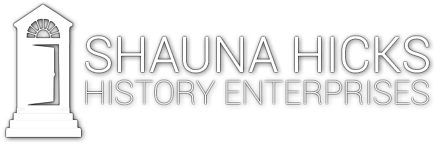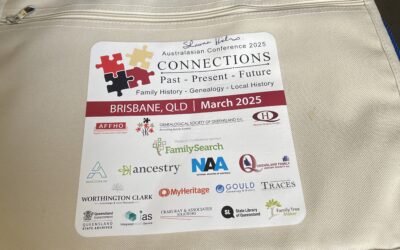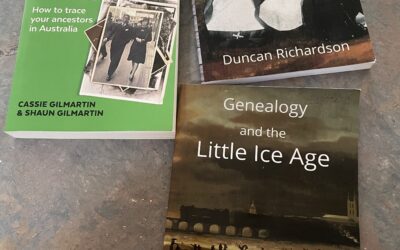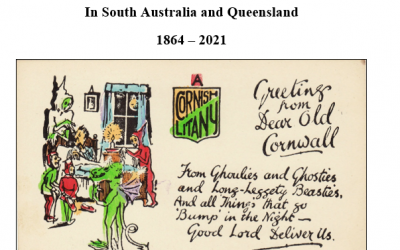This blog challenge is to stimulate my own genealogy blogging efforts in 2014 by focussing on a different kind of genealogical record each week. I wanted a challenge that reflected my own archival background as well as my own genealogy interests and there are probably lots of other records that I could have included. The challenge has an Australian focus but most of these records will be found just about anywhere in the genealogy world.
The 52 different types of genealogical records I finally decided on are listed in no particular order (each week will be a random surprise). Originally I planned to do this over 52 weeks but I now realise that I have to factor in travel and illness so it will continue a little bit over a year. Anyone is welcome to do all or part of this blogging challenge. Let me know if you are participating and I will put a link to your post under each week’s challenge.
So far I know of six bloggers who are taking up the challenge from time to time and I have put links to their individual entries at the end of each week’s blog if they have submitted something for that week. Thanks Judy Webster, Sharn White, Cassmob, Anne, Campaspe Library and Sharon for participating and encouraging me to keep up the blog challenge myself!
Also participating in this blog challenge: Anne Week 15
Sharon Week 15
Links to Week 1 Military Medals Week 2 Internal Migration Week 3 Probates (wills and administrations) Week 4 Memorial Cards Week 5 Family Stories Week 6 Land Records Week 7 Local Histories Week 8 Diaries Week 9 Inquest Records Week 10 Occupation Records Week 11 Newspapers Week 12 Gazetteers Week 13 Personal Names and Surnames Week 14 Cemetery Records
Week 15 Civil Registration and Certificates
The introduction of civil registration of births, deaths and marriages was a real plus for family history as certificates can give us those vital clues for moving back through the generations. Of course dates it was introduced and information on certificates varies from country to country but we really cannot confirm our research without these documents.
Birth certificates give us information on the parents and where they were from, marriage certificates also give us information on the parents and death certificates are particularly useful for telling us how long someone was in the colony or state if they an immigrant. Graham Jaunay‘s chart of information on Australian certificates is a handy checklist before buying certificates as it clearly outlines what information is available when.
While certificates can be a straight forward way of progressing backwards, there are traps, both unintentional and intentional. Birth certificates are generally considered more reliable as the parents are usually the informants. With my Irish Johnston family, both Adam and Maria were illiterate which meant that someone else wrote down what they said when they registered their ten children. By buying all ten certificates I was able to narrow down and eventually find the place in Ireland that Adam came from even though the certificates had a variety of spellings for the place name.
Marriages are also considered to be reliable as both parties to the marriage provide the information. But what if either one had something to hide? My great great grandfather James Carnegie gave the names of his grandparents John and Helen Carnegie as his parents which confused me for a little while. It turned out that James was illegitimate and was possibly raised by his grandparents. I still do not know if he used their names to hide his illegitimacy or he genuinely believed they were his parents. A puzzle I am still working on.
Death certificates can be the most misleading depending on the informant. Even family members may give the wrong information or they do not know the required information to start with. I like purchasing death certificates because I want to know the cause of death and to see if any illnesses tend to run in family lines. Sometimes you can get a daughter’s married name and address if she is the informant and if you are trying to trace all the descendants for someone, death certificates help to give you the names of all the children, unless they predeceased the person.
If you cannot find someone arriving in a particular colony/ state have you checked what is on the death certificate in case they arrived in a different colony/state? People moved around more than we perhaps think. My great great grandparents Thomas and Elizabeth Price arrived in Sydney in 1878 and as far as the family knew they lived in Charters Towers Queensland for most of their lives. I purchased their ten children’s’ birth certificates and was surprised at how much they had travelled through New South Wales and Queensland. Children were born in Caleula, NSW in 1878, Orange NSW 1880, Parramatta NSW 1881, Kiama NSW 1883, Broughton Creek NSW 1886, Nattai NSW 1887, Bundamba QLD 1889, still born child Bundaberg QLD 1892, and finally Charters Towers 1894 and 1897. So for about 15 years they were wandering around before making Charters Towers their home, something I would not have known if I had not purchased all of the children’s birth certificates.
What happens when you cannot find an entry in the BDM indexes? Usually it is a spelling variation and you need to try all possibilities or even search on a given name with no surname and or perhaps widen your time frame. One of my family members, James Phillips, was simply not there and in desperation I purchased the birth certificate of his youngest sister Lucy Lydia Phillips and as this was a Queensland certificate, it was an image of the original entry complete with annotations.
To my complete surprise, it was annotated with the death of the person whose birth I was trying to find. As an older brother James was listed as a living sibling and next to his name was an annotation re his death in 1951. Obviously when he died, the Registrar’s staff tried to find his birth so that they could annotate it with his death date but like me, they could not find the birth so they annotated his younger sister’s birth entry. How lucky for me but it does show that these early annotations can be quite useful. I have lots of certificates (without annotations) I purchased before digital images and I have often wondered what annotations, if any, are on them but the cost of repurchasing just to find out, is not worth it.
But if you have a brick wall then relooking at your certificates may be useful. Have you obtained certificates for siblings if you are having a problem with a direct ancestor? Have you checked the witnesses on marriage certificates, are they family members? Do timelines and places fit with known family movements? Are the occupations significant? Is it time to relook at what certificates you have and are there any pieces of information missing? The cost of certificates can be expensive but digital images are often cheaper so make sure you look at what options are available. Certificates have to be my favourite record! Are they your?





Hi Shauna – I think we are so lucky in Australia with our system of certificates. I wrote about them in general as part of my blogging efforts in this years A to Z challenge last month: http://ayfamilyhistory.blogspot.com.au/2014/04/b-is-for-births-deaths-and-marriages.html
For Australian family history I believe it is essential for the researcher to purchase certificates for all members of the family being researched, particularly if the family moved around. With each certificate you learn something new and for many people these are the only records we have of their lives. I know buying certificates can be expensive but it isn’t so painful if you spread it out over time.
I also find Jaunay’s table very useful.
Regards Anne
Thanks Anne I have put a link to your post on my page too. Certificates are so important to making sure you are tracing the right family.
Hi Shauna, I just want to say thanks for sharing all this valuable information. The blog challenge is a great idea and so helpful.
Julie
I agree that certificates are both necessary and invaluable. great news about the digital image….I’m tempted to go back for some of my early ones and see if there was more to them than the typed certificate.